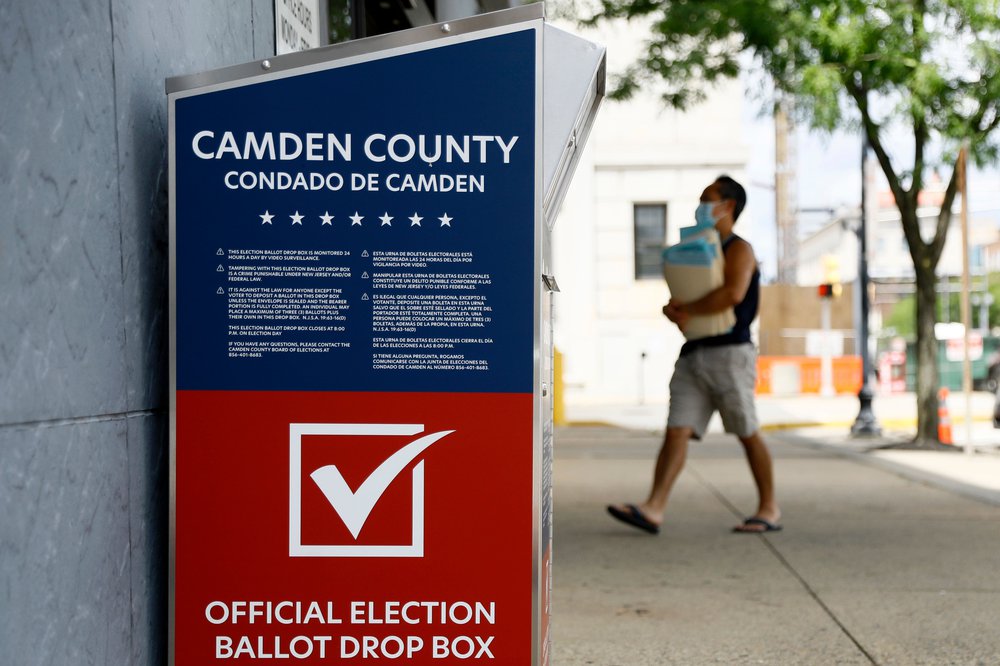Local NJ Democrats Want Election Ballot Reform, But Party Bosses Are Skeptical
Jan. 17, 2022, 10:01 a.m.
Reformers seek to remove the so-called “county line” to establish greater equity in election contests.

Several vote-by-mail drop boxes such as this was on hand for the New Jersey 2020 primary election outside the Camden, NJ.
An ongoing effort to redesign election ballots in New Jersey as a way of establishing equal competition is facing opposition from powerful political influencers in the state, even in small towns where a number of progressive activists are calling for change.
The fight is over the so-called “county line” – a column that appears on the primary ballot featuring candidates endorsed by county committees in lesser known election contests below more popular races, such as a gubernatorial or U.S. Senate contest. That order is overseen by the majority of the state’s county committees, placing their endorsed candidates on the county line, giving them a competitive advantage over non-endorsed candidates. Non-endorsed candidates are scattered in other columns, which can lead to confusion for voters.
Better Ballots NJ, a coalition of good government groups, is campaigning to eliminate the county line and make the ballots appear like every other state in the country, where candidates running for the same office are grouped together.

“There wasn't a single race where it didn't make a substantial difference,” said Julia Sass Rubin, an associate professor at the Edward J. Bloustein School of Planning and Public Policy at Rutgers University and a volunteer with Better Ballots NJ. In a 2020 analysis report she led of the June primary election in the state, she found candidates on the county line won by an average of 35 points in the primary.
“That’s almost insurmountable,” she said.
Sass Rubin found being placed on the county line gave candidates an even greater advantage than incumbency did.
“The incumbents often win. But what we saw in this last cycle in 2021 is that every incumbent who lost the line–and there was a surprisingly large number of them this time around–either lost or lost in that county,” Sass Rubin said. “So the incumbency was inferior to the line. The line was more powerful.”
The group is pitching their case to organizations, elected officials and party organizations asking them to sign a petition for ballot reform. So far, it has 79 signatories, including a smattering of party organizations and elected officials.
But part of the problem, Sass Rubin says, is the way the county line functions to block reform.
An ongoing fight in the town of Maplewood, home to 25,000 residents, is a case in point.
Sass Rubin recently presented her research to democratic committee members in the town, where a subcommittee led by former mayor Fred Profeta is advocating for change.
“Ironically, the most serious impact on the democratic process in Maplewood comes from the total collapse of the Republican party,” Profeta said.
Just like in much bigger cities like New York or Newark, the winner of the democratic primary easily wins the general election in Maplewood, a progressive and diverse suburb in Essex County, which is home to one of the most powerful democratic machines in the state.
Since the democratic committee chooses who will run on the county line in the party’s primary, it’s effectively choosing who will hold elected office in Maplewood.
“It's disturbing that there's no real competition in the primary, but it's really compounded when there's no Republicans running in the general election,” Profeta said. “There are no debates anymore, there is no vigorous campaigning and primary challenges are few and far between.”
A meeting of the Maplewood Democratic Party focused on keeping the county line is scheduled for Wednesday. Guests that will argue to keep the line include retired state Senator and Majority Leader Loretta Weinberg, Essex County Clerk Chris Durkin and Leroy Jones, who doubles as chair of the state Democratic Party and Essex County Democratic Committee.
The Maplewood meeting will be held behind closed doors. Neither the public nor the press are allowed to attend.
Profeta sees their involvement as a way to pressure locals to back off their ballot reform effort.
Jones declined to be interviewed for this story. Ian Grodman, chair of the Maplewood Democratic Committee, says there's been no pressure on his members.
“I invited these people to come and speak to our local democratic committee. They did not ask to come to speak,” Grodman said. He invited them because he wanted knowledgeable people to explain the benefits of the endorsement process.
Grodman said the committee could do more to educate voters, but noted the endorsement process works well.
“We have worked very, very hard in Maplewood to open up this process more over these years that I've served as the chair,” he said. “We have more people involved in this nominating procedure than we've ever had before we have more people involved in making the decisions.”
Most voters aren’t paying attention to the local races and rely on the vetting process conducted by his committee, Grodman said.
“The party has met with these people, has interviewed and learned a lot about them and made an endorsement of them. I think [that] can be very helpful on the local level,” Grodman said.